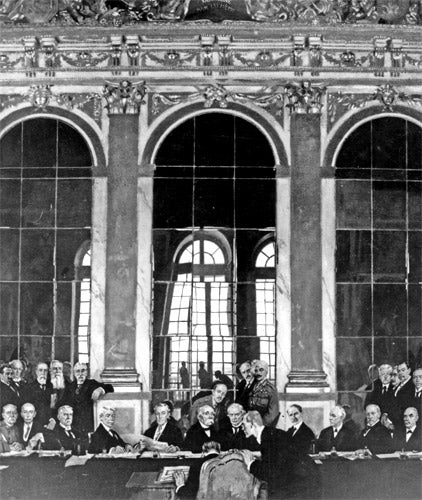Ninety years on, First World War is finally over for Germany

Germany marks the end of an era this Sunday when, 92 years after the end of hostilities, it will make the last of its First World War reparations payments that once provoked a wave of resentment strong enough to sweep Adolf Hitler to power.
The payment date, which coincides with the 20th anniversary of Germany's peaceful reunification, will quietly close the last chapter of a conflict that arguably did more than any other to shape the nation's future.
Germany's debt derives from the massively unpopular 1919 Versailles Treaty. This Sunday, Berlin will pay the last interest instalment on foreign bonds issued in 1924 and 1930 to cover the huge reparations demands made by the victorious First World War Allies.
The event will take place without ceremony and, despite its historical significance, has received only scant public attention, largely because it is a reminder of a terrible period that most Germans would rather forget.
Gerd Krumeich, a Great War historian, said that Germans' sense of injustice was stirred by the despised article 231 of the Versailles Treaty, which gave Germany sole blame for the outbreak of the war and forced it to make massive reparation payments. That sense of injustice, he said, was quickly seized upon by Hitler.
"The central factor behind Hitler's rise to power was his promise: 'I'll win this war in the end, I will undo this injustice, tear up this treaty and restore Germany to its old greatness," he told Der Spiegel magazine. "The reparations payments compounded everything. Not only was Germany morally to blame, it was also to pay an outlandish sum most people had never even heard of."
The sheer scale of the reparations, plus galloping inflation, was enough to bankrupt the unsteady Weimar Republic of the 1920s. Germany's reparations bill was set at the then mind-boggling figure of 269 billion gold marks before it was reduced to 112 billion gold marks, payable over 59 years, during the 1920s.
Germany suspended payments during the Great Depression and Hitler refused to continue them when he came to power in 1933. But, in 1953, West Germany agreed to honour its Great War reparation obligations. Communist East Germany, however, declined. It was agreed that Germany should be allowed to wait until it was reunited before paying some 125 million euros in outstanding interest on foreign debt accrued after 1945. The fall of the Berlin Wall in November 1989 followed by Germany's reunification less than a year later fulfilled the conditions of the agreement.
Join our commenting forum
Join thought-provoking conversations, follow other Independent readers and see their replies
Comments
Bookmark popover
Removed from bookmarks